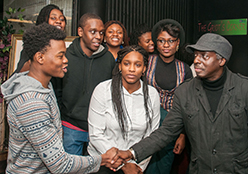/prod01/production-cdn-pxl/media/umassdartmouth/news/unityhousegallery.jpg?text=320+Jpg)
UMassD’s Black History Month Planning Committee becomes Black History 4 Seasons Council and offers programming throughout the year
For more than 25 years, UMass Dartmouth has celebrated Black History Month in February to help raise students' awareness of the contributions made by Black Americans. This year, the UMass Dartmouth Black History Four Seasons Council (BH4SC), formerly the Black History Month Planning Committee, is planning to engage the UMass Dartmouth community in ongoing events honoring Black history all year long.
The University is kicking off Black History Four Seasons in February. Faculty presentations, student forums and celebrations, films, read-ins, and historical site visits throughout and beyond the New England area will run throughout the year. Topics and programming will cover politics, social justice, literature, theater, visual arts, and various genres of music – including blues, gospel, hip-hop, jazz, and R&B.
Engaging students and the community
"Part of the mission of the Black History Four Seasons Council is to engage students, as well as the broader community, in deeper conversations and foster ongoing dialogue about the unique experiences and contributions of Black Americans," says BH4SC Co-Chair Peggy Dias. "Planning and executing events, plus getting a large number of people to attend all of these events in one month has been difficult, so we are very excited to provide programs and events throughout all seasons of the year versus condensing more than a century of this facet of American history into one month."
The broadened initiative references many topics introduced in courses across many of UMass Dartmouth colleges, including the College of Visual and Performing Arts, School of Education, and College of Arts and Sciences. One of the goals of the BH4SC is to collaborate with faculty and other departments to offer programs and events that coincide with topics being taught in the classroom.
Learning about Black history throughout the year
"We’ve found that it’s a necessity to offer programming throughout the year, particularly because many black students have expressed the desire to learn more about a comprehensive history," says Director of the Frederick Douglass Unity House and BH4SC Co-Chair Nicole Williams. "As educators, it is our job to teach that history as well as the history of many different cultures. The campus is becoming more diverse, so it’s essential that there always be opportunities and platforms to engage, learn, and continue the conversation about Black history."
Another benefit of the expanded programming is that it provides an opportunity to acknowledge the intersections in terms of various identities and increase cultural competency. "Raising awareness of the intersection between African-American history and culture with those of other cultures, including the local Cape Verdean and Caribbean populations, and their unique contributions would certainly enhance the global awareness in our students," says EEO Specialist David Gomes of UMass Dartmouth's Office for Diversity, Equity & Inclusion.
 Raising awareness, having conversations, addressing issues
Raising awareness, having conversations, addressing issues
Students and faculty have also expressed enthusiasm about the enhanced opportunity to learn about their history throughout the four seasons of the year. "I'm happy that the celebration of Black history, which is also American history, has been extended to a full year on campus, because I feel there is a racial divide amongst the students," says Civil Engineering major Rachelle Edouarzin. "I'm hoping that this program makes the divide less pronounced and allows students to really engage with each other."
"Introducing year-long programming is a great way to raise awareness, have necessary conversations, and work toward getting issues addressed," says Charlemya Erasme who is a sophomore majoring in biology. "There are so many positive outcomes due to these events and ideas. Without such events, it seems if people don't come to the Frederick Douglass Unity House, there is a lack of awareness about conversations, events, and issues centered on the black experience."
"Often times there is a perception in an academic environment in which students may feel like there is exclusivity when history is about all of us, and our history collectively," says Bryan McFarlane, UMass Dartmouth Professor of Fine Arts. "This restructuring of the Council and duration of programs is a way of reinforcing what Black history is about. It is part of an embodiment of an entire experience. The meaning of the Black experience in the American culture is so meaningful that it should be celebrated throughout the year."
Inaugural year of programming begins February 4
The inaugural year of programming begins Thursday, February 4, as the BH4SC welcomes back Dr. Thom Ranuga, Chancellor Professor Emeritus, to give the keynote address entitled "The Struggle for Meaningful Change in Education from Elementary Schools to the University Level: The Evolution of the Fight By Blacks for Inclusion, Justice and Equality. Dr. Ranuga will also present his book Surviving Apartheid. The reading will be followed by a book signing and reception.
For the complete details on this event and the full schedule of upcoming events: umassd.edu/blackhistory